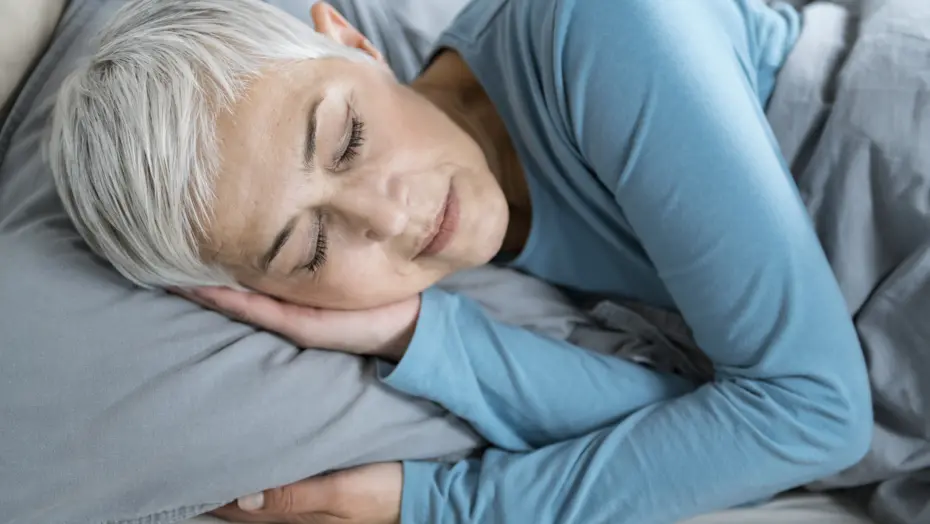Table of Contents
Struggling to sleep during menopause? You’re not alone, and you’re not imagining it. Menopause insomnia is one of the most frustrating symptoms women face during this stage of life. Tossing and turning at 2 a.m., sweating through your sheets, feeling anxious for no clear reason, sounds familiar? The good news is, doctors do have ways to help, and many of them are natural. In this article, we’ll walk through how experts address menopause insomnia, including remedies that support your body and mind without heavy medications.
Why Does Menopause Mess With Your Sleep?
It all starts with shifting hormones. Estrogen and progesterone, two major players in the sleep-wake cycle, begin to drop during perimenopause and menopause. Less estrogen means more trouble staying asleep, and less progesterone, known for its calming effect, can lead to racing thoughts and anxiety at night.
Some women also experience hot flashes at night, which can jolt you awake and make it hard to fall back asleep.
Common Symptoms of Menopause Insomnia
- Difficulty falling asleep
- Waking up frequently during the night
- Early morning awakenings
- Night sweats and hot flashes
- Restlessness or anxiety around bedtime
- Feeling unrefreshed in the morning
If any of these sound familiar, you’re likely dealing with menopause insomnia and anxiety, which often go hand-in-hand.
How Doctors Approach Menopause Insomnia Treatment
Doctors start by identifying your specific triggers. Some women struggle more with hormonal imbalance, while others may have lifestyle habits or stressors that worsen their sleep. A good doctor will look at the full picture and start with natural strategies before recommending medication.
Let’s explore the most trusted and effective options.
1. Melatonin for Menopause Insomnia: A Natural Sleep Booster
Melatonin is a hormone your body naturally makes to signal that it’s time to sleep. But menopause can disrupt your internal clock. Supplementing with melatonin, especially low doses, can help gently reset your rhythm.
Doctors often recommend melatonin as one of the first natural options for menopause insomnia relief because it’s non-habit-forming and gentle on the system. However, always talk to your doctor about the right dosage for your body.
2. Magnesium and Perimenopause Insomnia: A Calming Mineral
Magnesium plays a major role in sleep regulation. It helps relax your muscles, reduce nighttime anxiety, and promote deeper sleep. Some women find that taking a magnesium glycinate supplement in the evening helps them fall asleep faster and stay asleep longer.
3. Hormone Replacement Therapy (HRT) and Sleep
Many women ask about HRT and sleeplessness, and rightly so; replacing lost hormones can directly impact sleep quality. Estrogen therapy, especially through estrogen patches, has been shown to improve sleep, reduce hot flashes, and ease anxiety.
But here’s the deal: HRT isn’t for everyone. Some women can’t or choose not to take it. If you’re already on HRT and still not sleeping, you may be dealing with HRT sleep problems that require a dosage adjustment or a different hormone formulation.
Estrogen patch insomnia relief often comes with finding the right patch strength or pairing it with lifestyle changes.
4. Cognitive Behavioral Therapy (CBT) for Insomnia
CBT-I is considered one of the best sleep aids for menopause insomnia, and it doesn’t involve pills. This therapy helps you change thoughts and behaviors that interfere with sleep. It’s especially helpful for those dealing with menopause insomnia and anxiety.
Doctors often recommend CBT-I before turning to prescription menopause insomnia medications, because it gets to the root of the issue and provides long-term results.

5. Lifestyle Tweaks That Actually Work
- Keep it cool: Lower the thermostat to 65°F (18°C) and use breathable sheets. This helps with hot flashes at night insomnia issues.
- Limit alcohol and caffeine: These mess with hormone balance and can spike night sweats.
- Stick to a routine: Going to bed and waking up at the same time every day trains your body to expect rest.
- Move your body: Daily exercise—even a walk—can improve sleep quality.
- Wind down right: Try deep breathing, light yoga, or a relaxing podcast before bed.
6. Medications: When Natural Isn’t Enough
For some women, natural treatments aren’t enough. That’s where menopause insomnia medication comes in, but it should be a thoughtful choice.
Doctors might recommend:
- Low-dose antidepressants (if anxiety is a key factor)
- Prescription sleep aids (short-term use only)
- Hormone therapy tailored to your needs
Always ask about the pros and cons before starting any medication. The goal is to treat the root cause, not just knock you out at night.
So… How Do You Cure Menopause Insomnia?
If you’re wondering how to cure menopause insomnia, here’s the honest answer: there’s no one-size-fits-all fix. But with the right approach, most women can find serious relief. The combination of hormone support, lifestyle adjustments, therapy, and natural supplements like melatonin or magnesium can make a huge difference.
It’s about finding your balance. And with the right guidance—from your doctor, supportive communities, and research-backed tools—you absolutely can sleep better and feel like yourself again.

